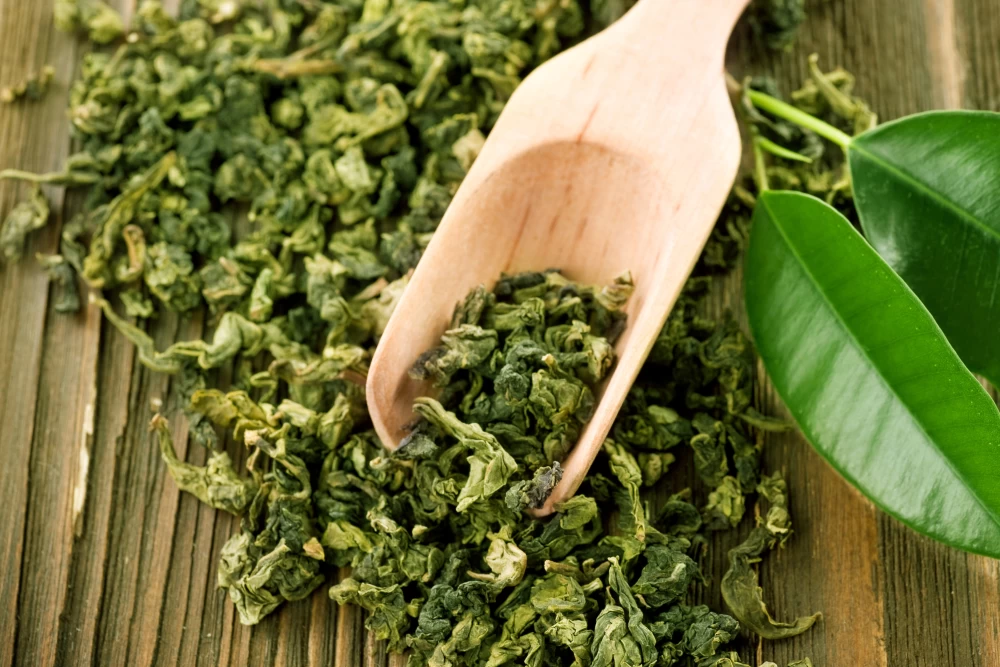
- 23rd March 2023
Table of Contents
Benefits of Green Tea
Green tea is a popular drink that has been enjoyed for thousands of years. It contains powerful antioxidants called catechins, which have been linked to numerous health benefits, including improved liver function. In fact, studies suggest that drinking green tea may help reduce the risk of developing a fatty liver. One study found that participants who drank at least five cups of green tea per day had a 50% lower risk of developing fatty liver disease than those who didn't drink green tea. Additionally, consuming green tea regularly may help improve liver enzyme levels and reduce inflammation in the liver. Besides its potential benefits for the liver, green tea has other advantages as well. The antioxidants in green tea are known to promote heart health by lowering blood pressure and improving cholesterol levels. It also aids in weight loss by increasing metabolism and burning fat. Overall, incorporating green tea into your diet can provide numerous health benefits, especially for those looking to improve their liver function or manage their weight.
What is Fatty Liver?
Fatty liver is a condition in which there is an excessive accumulation of fat in the liver cells. It is a relatively common condition that can be caused by several factors, including alcohol consumption, obesity, and certain medications. Fatty liver can lead to more severe conditions such as cirrhosis and liver failure if left untreated. The good news is that fatty liver can often be managed through lifestyle changes, including dietary modifications. Green tea has been shown to have potential benefits for people with fatty liver disease due to its high antioxidant content. Antioxidants help protect the body against free radicals, which can cause damage to cells and contribute to the development of chronic diseases like fatty liver. Green tea also contains catechins, which are known for their anti-inflammatory properties. Inflammation plays a role in the progression of fatty liver disease and reducing inflammation may slow down the damage done to the liver over time. Adding green tea to the diet or taking green tea supplements under medical supervision may help improve symptoms associated with fatty liver disease and promote overall health.
How Does Green Tea Help?
Green tea has become a popular beverage due to its numerous health benefits. One of the benefits is that it can help with fatty liver disease. Green tea contains antioxidants called catechins, which help reduce inflammation and oxidative stress in the liver. The catechins in green tea also help improve liver function by reducing fat accumulation and improving insulin sensitivity. Additionally, studies have shown that drinking green tea can lower the risk of developing non-alcoholic fatty liver disease (NAFLD), which is commonly associated with obesity and high cholesterol levels. The polyphenols found in green tea have been shown to decrease the amount of fat stored in the liver and improve insulin resistance. Overall, incorporating green tea into a healthy diet for individuals with fatty liver disease can be beneficial due to its natural ability to improve liver function, reduce inflammation and oxidative stress, and prevent NAFLD. However, it is important to note that green tea should not be used as a replacement for medical treatment or advice from a healthcare professional.
Catechins in Green Tea
Catechins are a type of plant compound found in green tea that has been linked to various health benefits, including the prevention and management of fatty liver disease. Studies have shown that catechins can help improve liver function by reducing inflammation, oxidative stress, and fat accumulation. This is especially important for individuals with non-alcoholic fatty liver disease (NAFLD), a condition characterized by excess fat buildup in the liver. Green tea contains several types of catechins, with epigallocatechin gallate (EGCG) being the most abundant and studied. EGCG has been shown to have potent antioxidant properties that can protect against liver damage caused by free radicals. It also helps regulate lipid metabolism by reducing triglyceride levels and increasing HDL cholesterol levels. Incorporating green tea into your diet may be an effective way to manage fatty liver disease. However, it's important to note that drinking excessive amounts of green tea or taking high doses of catechin supplements may have adverse effects on your health. Therefore, it's best to consult with your healthcare provider before making any significant changes to your diet or supplement routine.
Other Health Benefits of Green Tea

In addition to its ability to improve fatty liver, green tea is also known for its other health benefits. Green tea is rich in antioxidants and polyphenols, which can help protect the body against damage from free radicals. This means that drinking green tea regularly may reduce the risk of certain chronic diseases such as heart disease, diabetes, and cancer. Moreover, research suggests that green tea may have a positive effect on brain function. The caffeine and L-theanine combination found in green tea can increase alertness and overall cognitive performance. Additionally, it has been shown to potentially reduce the risk of Alzheimer's and Parkinson's disease by protecting the neurons in the brain. Lastly, green tea may also aid in weight loss due to its high catechin content. Catechins are natural antioxidants that have been linked to an increased metabolism and fat burning process. While consuming green tea alone will not yield significant weight loss results, incorporating it into a healthy diet and exercise routine could potentially enhance weight loss efforts.
Potential Downsides to Drinking Green Tea
While green tea has been lauded for its many health benefits, there are also potential downsides to drinking it. For one, green tea contains caffeine, which can cause jitters or insomnia in some people. Moreover, the catechins found in green tea can interfere with iron absorption and digestion of certain proteins, leading to nutrient deficiencies if consumed excessively. Another potential downside is that green tea leaves may contain high amounts of fluoride. Prolonged consumption of high levels of fluoride is known to result in dental and skeletal fluorosis. Drinking too much green tea could also result in a decrease in bone density over time. Despite these potential drawbacks, overall, drinking moderate amounts of green tea each day still offers several health benefits for individuals with fatty liver disease. As such, it's important to weigh the pros and cons before incorporating any new food or drink into your diet and consult with a healthcare professional if you have any concerns about your intake levels.
Conclusion: Beneficial for Fatty Liver Diet
In conclusion, green tea is an effective supplement for individuals seeking to improve their fatty liver condition. The flavonoids in green tea have been shown to reduce inflammation and oxidative stress, which are the two major factors that contribute to the development of fatty liver disease. Furthermore, research has indicated that regular consumption of green tea can lead to a significant reduction in body weight and fat accumulation. Additionally, incorporating green tea into your daily routine can provide numerous health benefits beyond treating fatty liver disease. These include improved cardiovascular health, enhanced brain function, and decreased risk of certain types of cancer. It's important to note that while drinking green tea alone cannot reverse or cure fatty liver disease entirely, it can certainly be used as a beneficial supplement alongside other lifestyle changes such as exercise and a healthy diet. Overall, incorporating green tea into your daily routine provides numerous health benefits that extend beyond improving fatty liver disease. With its anti-inflammatory properties and ability to reduce body weight, it's a simple but effective addition for individuals looking to improve their overall well-being.














